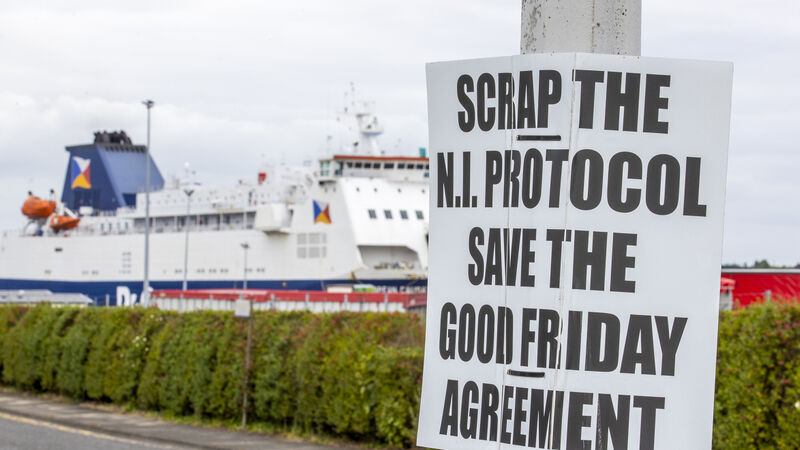Echo Chamber: Lack of progress on NI Protocol a huge worry

An anti-Northern Ireland Protocol sign close to Larne Port.
The UK decision to leave the EU means that the UK and the EU are no longer subject to the same trade rules. However, because Northern Ireland is the only part of the UK which shares a land border with an EU member state, the Republic of Ireland, special arrangements were deemed necessary in order to ensure that there are no restrictions on trade between Northern Ireland and the Republic of Ireland and the border between North and South remains open. Such an arrangement was also politically important given Northern Ireland’s history of conflict on the border question.
The Ireland/Northern Ireland Protocol — which is an annex to the UK-EU Withdrawal Agreement — is the formula agreed to ensure the maintenance of an open border on the island of Ireland. The Protocol facilitates Northern Ireland remaining in the UK customs territory, and simultaneously allows Northern Ireland to benefit from access to the EU single market (unlike the rest of the UK). This arrangement means that customs checks and controls at the land border between Northern Ireland and the Republic of Ireland can be avoided. However, in order to protect the integrity of the EU single market (of which Northern Ireland remains a part), it does require some checks and controls on certain goods from the rest of the UK (GB) entering Northern Ireland at the Irish Sea border to ensure that they comply with EU standards and regulations.
Nationalists, and also the non-aligned Alliance Party, (reluctantly) support the Protocol. For unionists however, the Protocol’s formula for maintaining an open border on the island of Ireland by moving the trade border to the Irish Sea, is seen as economically damaging and politically contentious. Unionists view the Protocol as undermining Northern Ireland’s place within the UK and challenging the core unionist constitutional position.
Northern Ireland comprises 18 five-seater constituencies. Similar to the Republic of Ireland, MLAs are elected based on PR-STV. In 2022, and for the first time ever, Sinn Féin was returned as the largest party winning 27 of the Assembly’s 90 seats (two more than the DUP). This entitles Sinn Féin to nominate for the position of First Minister and the DUP to nominate for the position of Deputy First Minister. However, these appointments cannot proceed without the cooperation and consent of both unionist and nationalist political parties. The DUP has refused to facilitate the appointment of the First and Deputy First Ministers until the Protocol is scrapped (or at minimum, radically revised). This means that the Northern Ireland Assembly has been unable to convene since the elections on May 5.
The DUP fought the Assembly elections on the promise that it would not participate in the formation of a Northern Ireland Executive unless the Protocol is scrapped and specifically, until the Irish Sea border between GB and Northern Ireland is removed.
The DUP and all other unionists in Northern Ireland regard the existence of customs checks and controls at Northern Ireland ports and airports as politically and economically detrimental to Northern Ireland’s interests.
The British government agreed the Protocol with the EU in October 2019, but since then has been pushing back against elements of the deal claiming that it does not command cross-community consent in Northern Ireland. The Irish government and the EU reject the necessity for the Protocol to enjoy such a measure of support noting that the Brexit vote itself did not require cross-community consent. Legally, there is no clear requirement that consent be applied to the Protocol because, under the terms of the Good Friday Agreement, consent only pertains to decisions within the Northern Ireland Assembly, and not to international treaties agreed by the British government.
Critics suggest that the British government’s approach is focused less on securing Northern Ireland’s best interests and more on appeasing the DUP and hard-line Tory Brexiteers in an effort to shore up support for the Prime Minister.

British government resistance to the implementation of the Protocol has been a source of immense frustration for the Irish government and has contributed to some souring of British-Irish relations. However, the decision by Prime Minister Boris Johnson’s government to bring forward legislation unilaterally disapplying the Protocol has led to a serious deterioration in that relationship. Taoiseach Micheál Martin has referred to the British government move as marking a ‘historic low point’ in the relationship between Britain and Ireland.
The two nationalist parties in Northern Ireland, Sinn Féin and the SDLP, along with the non-aligned Alliance Party support the implementation of the Protocol. A key benefit of the Protocol for these parties is that it facilitates and secures the existing open border between North and South. For nationalists in particular, the absence of physical barriers between Northern Ireland and the Republic is an important component of the Northern Ireland peace process.
The Protocol has also been welcomed by many businesses and sectors in Northern Ireland which now enjoy guaranteed access to both the UK and EU markets. In addition, the Protocol has also contributed to an increase in North-South trade — up by 65% in 2021.
The DUP and UUP, along with the smaller hardline TUV party, are opposed to the Protocol because it requires the existence and operation of regulatory checks and controls on goods moving between GB and Northern Ireland. Unionists are concerned about the extra bureaucratic and related transport costs associated with the Irish Sea border, and their overall negative impact on trade between GB and Northern Ireland. These concerns are shared by some sectors including the Road Haulage Association (RHA).
In addition, the introduction of (limited) trade barriers between GB and Northern Ireland is politically contentious for unionism and interpreted as undermining Northern Ireland’s position within the UK. In this context, unionists conceive a link between the Protocol and moves towards the achievement of a united Ireland.
Brexit has therefore reignited the constitutional question as an issue in Northern Ireland politics and contributed to a deterioration in relations between the unionist and nationalist communities.
No, Northern Ireland is not still part of the EU, but it does have access to the EU single market. This means that there are no customs or regulatory trade borders for goods which move between Northern Ireland and all other EU member states.
However, because the UK has now left the EU, neither the UK nor Northern Ireland has representation within the structures of the EU and so are not involved in devising those single market rules and regulations to which Northern Ireland is now subject.
On June 13, the British government published the Northern Ireland Protocol Bill. The bill provides that certain specified provisions of the Protocol will not have effect in the UK. This means that the British government is breaking international law by unilaterally disapplying elements of the Protocol — a move which has been heavily criticised by the Irish government and the EU.
The publication of the Northern Ireland Protocol Bill means that for businesses in Northern Ireland and for those who trade with Northern Ireland, there is now confusion about what legal and trade arrangements apply. This kind of uncertainty and instability is not good for business or for the economy generally. Many businesses and sectors in Northern Ireland, including for example Manufacturing Northern Ireland and the Northern Ireland Food and Drink Association (NIFDA), do not support abandoning the Protocol claiming that such a move will adversely impact on key sectors of the Northern Ireland economy.
There is also strong political opposition to the bill in Northern Ireland. A majority of Northern Ireland’s MLAs from Sinn Féin, the SDLP and the Alliance Party signed a letter to Prime Minister Johnson strongly criticising British government actions which they say are at odds with what a majority of Northern Ireland businesses and people want.
The DUP has welcomed the Northern Ireland Protocol Bill, but continues to resist pressure to nominate a Deputy First Minister. The party claims it is committed to going back into Stormont but only when it is reassured that the bill is making ‘real progress’ in its passage through Westminster. The bill, however, will take some time to proceed through parliament — possibly up to a year or more — and it is also likely to face strong opposition in Westminster.
The EU is refusing to renegotiate the Protocol and is pursuing legal action against the UK. The EU has also not ruled out the possibility of introducing punitive trade measures against the UK targeting specific British products by applying tariffs to them and impeding their access to the EU single market.
This latest Brexit episode has the potential to lead to a full-scale trade war between the UK and the EU. This would involve raising import tariffs or imposing other restrictions on imports. Such a development would have serious economic consequences for the UK and EU countries which trade with it. Given Ireland’s substantial trading relationship with the UK, the implications for Irish business and the economy would likely be severe.
A trade war would also pose a politically challenging problem for the Irish government because it would mean that the trade border between the UK and the EU would no longer be situated at the Irish Sea border but would instead move to the land border. In the context of a trade war, an open (land) border between the UK and the Republic of Ireland becomes highly problematic because it challenges the integrity of the EU single market. Foreign Affairs Minister Simon Coveney insists that there will not be a border on the island of Ireland. However, in the event of a trade war, the EU and the Irish government may face very difficult choices about how to police access to the EU single market.
Politically, a UK-EU trade war would represent a further deterioration in relations between the UK, the EU, and Ireland and may further destabilise Northern Ireland, impacting negatively on peace and stability there.
Mary C. Murphy holds a Jean Monnet Chair in European Integration and is a senior lecturer in UCC. She is an expert on Ireland/Northern Ireland and the EU, and recently published ‘A Troubled Constitutional Future: Northern Ireland after Brexit’ (Agenda Publishing).







 App?
App?


